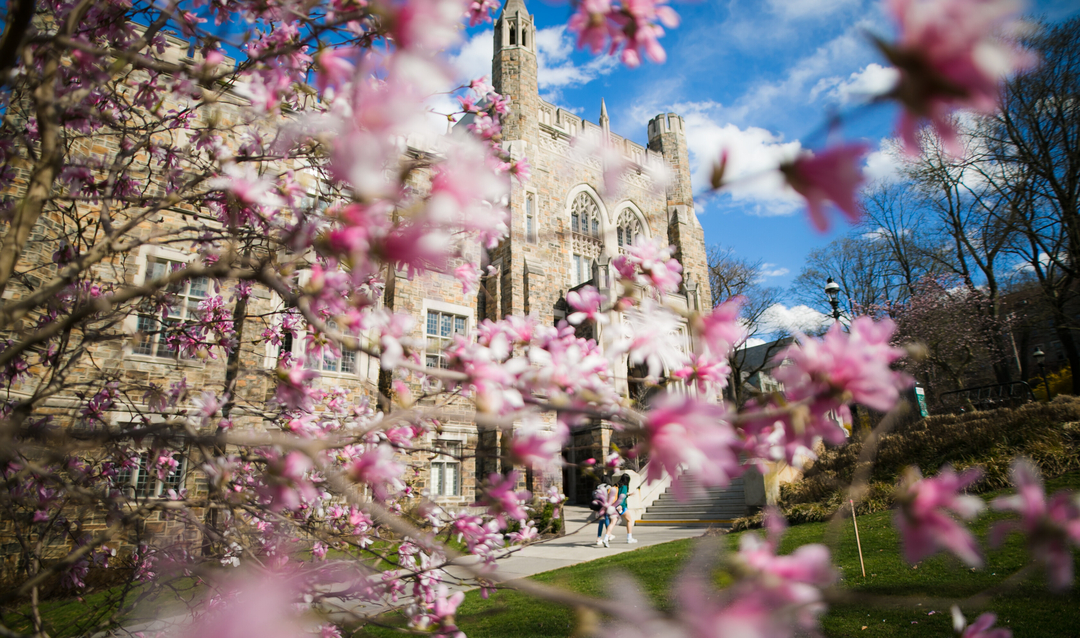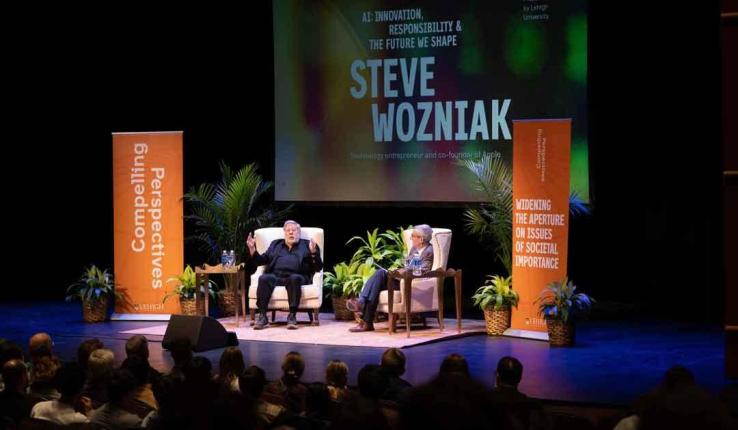Lehigh University’s Spring Strategy Town Hall, held on April 17, spotlighted momentum in its transformative 10-year strategy, Inspiring the Future Makers. With progress across research, education, campus engagement and innovation, university leaders shared milestones and highlighted progress on ambitious new initiatives aimed at reshaping Lehigh for the next decade and beyond.
President Joseph J. Helble ’82 opened the town hall by reaffirming the university’s commitment to long-term, measurable impact through the Future Makers strategy. “Our strategy is a roadmap for decision-making to guide our efforts and investments for up to a decade to come,” said Helble. “We’re excited to reflect on the progress we've made and the impactful strides ahead.”
From establishing two new University Research Centers this year to launching a forward-looking approach to undergraduate education, the meeting highlighted progress and purposeful ambition.
Key Highlights and New Initiatives
Expanding Research Impact
In February, Lehigh announced the launch of two new University Research Centers (URCs),furthering its commitment to solving real-world challenges through interdisciplinary collaboration:
- The Center for Community-Driven Assistive Technologies (CDAT)
- The Center for Advancing Community Electrification Solutions (ACES)
These additions follow the establishment of Lehigh’s first URC, the Center for Catastrophe Modeling and Resilience, which launched in February 2024. Together, the three centers form the foundation of a growing research ecosystem aimed at addressing urgent societal issues—from supporting individuals with disabilities to helping communities transition to increased demand for electrical power from areas like transportation, building systems and data centers. .
“These centers are designed to drive real-world impact,” said Provost Nathan Urban. “We are uniting faculty across colleges to confront pressing issues—from community electrification to inclusive assistive technology solutions.”
Urban also celebrated Lehigh’s new designation as an R1 research university by the Carnegie Classification of Institutions of Higher Education, placing it among the top 187 research universities in the U.S., a pivotal moment in the school’s research trajectory.
Reimagining the First-Year Experience
With a three-year pilot launching in Fall 2025, Lehigh’s new Exploratory First Semester Program will support first-semester, undecided students through a unique, problem-solving curriculum designed to enhance advising and career discovery.
“This program will allow students to explore their interests without stigma and find academic paths that truly excite them,” explained Terry-Ann Jones, deputy provost for undergraduate education. “We want every student to feel confident and supported as they explore their academic path—replacing uncertainty with a strong sense of belonging, possibility and purpose.”
Innovation in Education for Student Success: Math and AI
Lehigh is tackling academic barriers head-on with a belonging-focused intervention in calculus courses. With early data showing reduced failure rates and improved grades, the approach is showing promise. Looking ahead to Fall 2025, plans are to bring a generative AI tutor/coach to support student learning.
“Grades in gateway courses like calculus can define a student’s path,” said Urban. “We can help students learn more through interventions that are rooted in research and designed to foster both success and confidence.”
Urban also described a pilot of “Calculus for Makers,” a Spring 2025 initiative combining learning of calculus theory and applications with hands-on design in collaboration with Lehigh’s Design Labs.
Empowering the Community Through Engagement
Interim Vice President for Strategic Planning Mark Erickson outlined the university’s efforts to engage the campus deeply and consistently. “This is a living strategy,” Erickson noted. “We’re raising funds, building branding and launching a campus master plan all informed by the strategy and community input.”
2024/2025 Engagement Initiatives include:
- Town halls each semester
- Six small discussion dinners at the President’s residence
- Five Future Maker Forums
- AI Summit and Advisory Committee
- Continued investment in Future Maker Grants—fueling innovation from the ground up
“The Future Maker Grants have ignited creativity and collaboration in ways that truly align with our vision,” said Erickson.
Building the Organization of the Future
The university is also undergoing changes to improve responsiveness, resource planning and campus operations. New technologies like the RAPTOR resource planning system, unified communication platforms and mobile credentials are being rolled out, along with efforts to streamline website and AV support.
“These upgrades are not just about tools,” Erickson said. “They are about reimagining how we operate as a modern university.”
AI as a Strategic Priority
AI is no longer a niche interest at Lehigh—it’s becoming a centerpiece of its academic and operational evolution. The Generative AI Advisory Committee, announced during the January AI Summit, has begun making recommendations for university-wide adoption of AI in teaching, research and administration.
“This is a transformational moment,” Urban emphasized. “Generative AI is reshaping education and the workforce. Lehigh must lead,not follow,in this space.”
A Collective Path Forward
The university is preparing to release a Community and Economic Impact Report at its May board meeting. From bold educational reform to innovative research expansion, the Lehigh Strategy continues to set the stage for a future where creativity, community and progress intersect.
For More Information
Story by Amy Bilello





